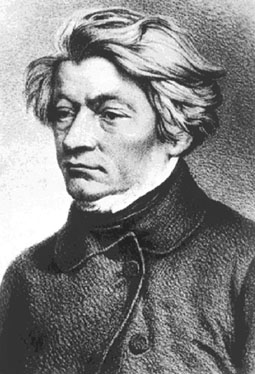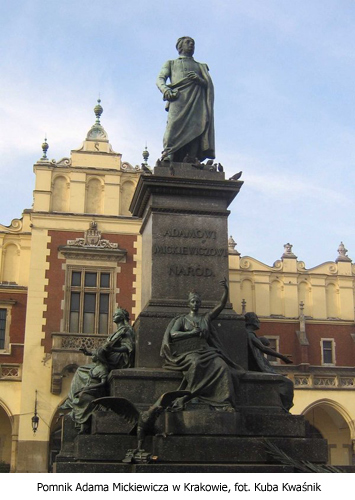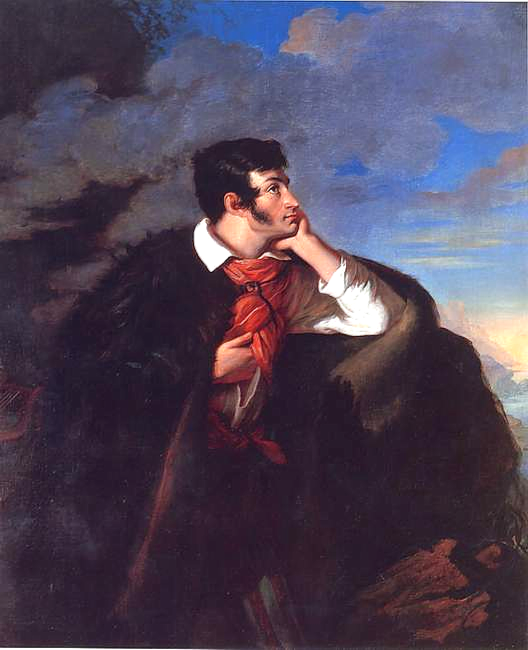Post by Bonobo on Feb 16, 2009 9:34:27 GMT 1
Adam Bernard Mickiewicz (pronounced: [mʲitsˈkʲevʲitʂ] ( listen); in Russian Адам Мицкевич, in Belarusian, Адам Міцкевіч; in Lithuanian, Adomas Bernardas Mickevičius; December 24, 1798 � November 26, 1855) is generally regarded as the greatest Polish Romantic poet. He ranks as one of Poland's Three Bards alongside Zygmunt Krasiński and Juliusz Słowacki.
Adam Mickiewicz was born at his uncle's estate in Zaosie, near Nowogródek (in Belarusian, Навагрудак; in Lithuanian, Naugardukas; in Russian, Новогрудок) in the Russian Empire (formerly in the Polish-Lithuanian Commonwealth; now in Brest Voblast, Belarus). His father Mikołaj Mickiewicz belonged to the Polish-Lithuanian-Commonwealth szlachta (nobility) and bore the hereditary Poraj coat-of-arms.
Mickiewicz studied at Vilnius University. Four years spent in Vilnius University made a great influence to his personality and work. He was very interested in Lithuanian history, which later became very important in his poems. In 1817 together with Thom Zan and other friends he created a secret Lithuanian organization, the Philomaths, that advocated independence from the Russian Empire. Following graduation, in 1819�23, he taught at a school in Kaunas.
In 1823 he was arrested, investigated for his political activities (membership in the Philomaths) and in 1824 banished to central Russia. He had already published two small volumes of miscellaneous poetry at Vilnius, which had been favorably received by the Slavic public, and on his arrival at Saint Petersburg found himself welcomed into the leading literary circles, where he became a great favorite both for his agreeable manners and his extraordinary talent of improvisation. In 1825 he visited the Crimea, which inspired a collection of sonnets (Sonety Krymskie�The Crimean Sonnets) with their admirably elegant rhythm and rich Oriental coloring. The most beautiful are "The Storm," "Bakhchisaray," and "The Grave of Countess Potocka". Crimea had earlier caught the eye of another famous contemporary poet, Alexander Pushkin, who had written about it in "The Fountain of Bakhchisarai" two years before Mickiewicz.
Mickiewicz is regarded as the greatest Slavic poet, alongside Alexander Pushkin, and as one of the best authors of the Romantic school.
The political situation in Poland in the 19th century was often reflected in Polish literature which, since the days of Poland's partitions took a powerful upward swing and reached its zenith during the period between 1830 and 1850 in the unsurpassed patriotic writings of Mickiewicz, among others. The writings of Mickiewicz have had such a tremendous influence upon the Polish mind that they can not be underestimated.
Because of the greater simplicity of his style and the directness of presentation, Mickiewicz reached more Polish hearts than either Krasiński or Słowacki and came to be regarded as the greatest interpreter of the people's hopes and ideals. He is the Zeus of the Polish Olympus and the immortal incarnation of Polish national spirit. He wrote at a time when Romanticism prevailed in European literature. His works bear the impress of that literary epoch, but they deal with intense and palpable realities. His two monumental works, marking the zenith of his power, are Dziady (Forefathers' Eve) and Pan Tadeusz. The latter is universally recognized as "the only successful epic which the 19th century produced." George Brandes says:
en.wikipedia.org/wiki/Adam_Mickiewicz




www.antoranz.net/CURIOSA/ZBIOR9/C0902/20090215-QZM03074_Mickiewicz-do-M.HTM
Do M * * *
Precz z moich oczu!...posłucham od razu,
Precz z mego serca!...i serce posłucha,
Precz z mej pamięci!...nie�tego rozkazu
Moja i twoja pamięć nieposłucha.
Jak cień tym dłuższy, gdy padnie z daleka,
Tym szerzej koło żałobne roztoczy�
Tak moja postać, im dalej ucieka,
Tym grubszym kirem twą pamięć pomroczy.
Na każdym miejscu i o każdej dobie,
Gdziem z tobą płakał, gdziem się z tobą bawił,
Wszędzie i zawsze będę ja przy tobie
Bom wszędzie cząstkę mej duszy zostawił.
Czy zadumana w samotnej komorze
Do arfy zbliżysz nieumyślną rękę,
Przypomnisz sobie: właśnie o tej porze
Śpiewałam jemu tę samę piosenkę.
Czy grając w szachy, gdy pierwszymi ściegi
Śmiertelna złowi króla twego matnia,
Pomyślisz sobie: tak stały szeregi,
Gdy się skończyła nasza gra ostatnia.
Czy to na balu w chwilach odpoczynku
Siędzisz, nim muzyk tańce zapowiadał,
Obaczysz próżne miejsce przy kominku,
Pomyślisz sobie: on tam ze mną siedział.
Czy książkę weźmiesz, gdzie smutnym wyrokiem
Stargane ujrzysz kochanków nadzieje,
Złożywszy książkę, z westchnieniem głębokiem
Pomyślisz sobie: ach! to nasze dzieje.
A jeśli autor po zawiłej probie
Parę miłosną na ostatek złączył,
Zagasisz świecę i pomyślisz sobie:
Czemu nasz romans tak się nie zakończył?
Wtem błyskawica nocna zamigoce:
Sucha w ogrodzie zaszeleszczy grusza
I puszczyk z jękiem w okno zatrzepoce�
Pomyślisz sobie, że to moja dusza.
Tak w każdym miejscu i o każdej dobie,
Gdziem z tobą płakał, gdziem się z tobą bawił,
Wszędzie i zawsze będę ja przy tobie,
Bom wszędzie cząstkę mej duszy zostawił.
...........................................................................
to M * * *Out of my sight!...I obey you at once,
Out of my heart!...it will be as you say.
Out of my memory? …No…there is no chance,
such a commandment can neither obey.
As shadows lengthen the further they fall,
thus they the compass of mourning extend;
and thus each parting step deepens the pall
swathing your memory, the further I wend.
In every place, and at each time of day,
where once we played, or where once we had wept,
everywhere, ever, with you I shall stay–
there, then, a part of my soul I had left.
If you, secluded in your lonely bower
upon your harp-strings a hand lay by chance,
you will recall then: “At this very hour
this very song I would sing to him once”.
Or, playing chess, when your new partner seizes
In mortal check-mate your king with his dame,
You will remember: just so stood the pieces
When we had finished our very last game.
Or, at a ball, when you rest, somewhat tired,
before the next dance commences, and see,
gaping, a vacant seat close by the fire,
you’ll think: “The last time he sat there with me”.
Or, when you’re reading, how, doomed from the start
Two lovers flounder in love’s deep morass;
Closing the book, with a sigh from the heart,
You’ll think: “Alas! This has happened to us!”
But if the author, from tragedy’s brink,
the loving couple unites in sheer bliss,
your candle out, you will sit still and think:
“–Why has our romance not turned out like this?”
When the night lightning’s flare flickers; perhaps
when in your garden soft rustles the pear,
when moaning owl at the window-pane taps,
then you will know: that my spirit is there.
In every place, and at each time of day,
where we were happy, or where we had wept,
everywhere, ever, I with you shall stay–
for, there, a part of my soul I had left.
tłumaczył/translated by:
Marcel Weyland (Sydney)
mpweyland@bigpond.com
Adam Mickiewicz was born at his uncle's estate in Zaosie, near Nowogródek (in Belarusian, Навагрудак; in Lithuanian, Naugardukas; in Russian, Новогрудок) in the Russian Empire (formerly in the Polish-Lithuanian Commonwealth; now in Brest Voblast, Belarus). His father Mikołaj Mickiewicz belonged to the Polish-Lithuanian-Commonwealth szlachta (nobility) and bore the hereditary Poraj coat-of-arms.
Mickiewicz studied at Vilnius University. Four years spent in Vilnius University made a great influence to his personality and work. He was very interested in Lithuanian history, which later became very important in his poems. In 1817 together with Thom Zan and other friends he created a secret Lithuanian organization, the Philomaths, that advocated independence from the Russian Empire. Following graduation, in 1819�23, he taught at a school in Kaunas.
In 1823 he was arrested, investigated for his political activities (membership in the Philomaths) and in 1824 banished to central Russia. He had already published two small volumes of miscellaneous poetry at Vilnius, which had been favorably received by the Slavic public, and on his arrival at Saint Petersburg found himself welcomed into the leading literary circles, where he became a great favorite both for his agreeable manners and his extraordinary talent of improvisation. In 1825 he visited the Crimea, which inspired a collection of sonnets (Sonety Krymskie�The Crimean Sonnets) with their admirably elegant rhythm and rich Oriental coloring. The most beautiful are "The Storm," "Bakhchisaray," and "The Grave of Countess Potocka". Crimea had earlier caught the eye of another famous contemporary poet, Alexander Pushkin, who had written about it in "The Fountain of Bakhchisarai" two years before Mickiewicz.
Mickiewicz is regarded as the greatest Slavic poet, alongside Alexander Pushkin, and as one of the best authors of the Romantic school.
The political situation in Poland in the 19th century was often reflected in Polish literature which, since the days of Poland's partitions took a powerful upward swing and reached its zenith during the period between 1830 and 1850 in the unsurpassed patriotic writings of Mickiewicz, among others. The writings of Mickiewicz have had such a tremendous influence upon the Polish mind that they can not be underestimated.
Because of the greater simplicity of his style and the directness of presentation, Mickiewicz reached more Polish hearts than either Krasiński or Słowacki and came to be regarded as the greatest interpreter of the people's hopes and ideals. He is the Zeus of the Polish Olympus and the immortal incarnation of Polish national spirit. He wrote at a time when Romanticism prevailed in European literature. His works bear the impress of that literary epoch, but they deal with intense and palpable realities. His two monumental works, marking the zenith of his power, are Dziady (Forefathers' Eve) and Pan Tadeusz. The latter is universally recognized as "the only successful epic which the 19th century produced." George Brandes says:
en.wikipedia.org/wiki/Adam_Mickiewicz



www.antoranz.net/CURIOSA/ZBIOR9/C0902/20090215-QZM03074_Mickiewicz-do-M.HTM
Do M * * *
Precz z moich oczu!...posłucham od razu,
Precz z mego serca!...i serce posłucha,
Precz z mej pamięci!...nie�tego rozkazu
Moja i twoja pamięć nieposłucha.
Jak cień tym dłuższy, gdy padnie z daleka,
Tym szerzej koło żałobne roztoczy�
Tak moja postać, im dalej ucieka,
Tym grubszym kirem twą pamięć pomroczy.
Na każdym miejscu i o każdej dobie,
Gdziem z tobą płakał, gdziem się z tobą bawił,
Wszędzie i zawsze będę ja przy tobie
Bom wszędzie cząstkę mej duszy zostawił.
Czy zadumana w samotnej komorze
Do arfy zbliżysz nieumyślną rękę,
Przypomnisz sobie: właśnie o tej porze
Śpiewałam jemu tę samę piosenkę.
Czy grając w szachy, gdy pierwszymi ściegi
Śmiertelna złowi króla twego matnia,
Pomyślisz sobie: tak stały szeregi,
Gdy się skończyła nasza gra ostatnia.
Czy to na balu w chwilach odpoczynku
Siędzisz, nim muzyk tańce zapowiadał,
Obaczysz próżne miejsce przy kominku,
Pomyślisz sobie: on tam ze mną siedział.
Czy książkę weźmiesz, gdzie smutnym wyrokiem
Stargane ujrzysz kochanków nadzieje,
Złożywszy książkę, z westchnieniem głębokiem
Pomyślisz sobie: ach! to nasze dzieje.
A jeśli autor po zawiłej probie
Parę miłosną na ostatek złączył,
Zagasisz świecę i pomyślisz sobie:
Czemu nasz romans tak się nie zakończył?
Wtem błyskawica nocna zamigoce:
Sucha w ogrodzie zaszeleszczy grusza
I puszczyk z jękiem w okno zatrzepoce�
Pomyślisz sobie, że to moja dusza.
Tak w każdym miejscu i o każdej dobie,
Gdziem z tobą płakał, gdziem się z tobą bawił,
Wszędzie i zawsze będę ja przy tobie,
Bom wszędzie cząstkę mej duszy zostawił.
...........................................................................
to M * * *Out of my sight!...I obey you at once,
Out of my heart!...it will be as you say.
Out of my memory? …No…there is no chance,
such a commandment can neither obey.
As shadows lengthen the further they fall,
thus they the compass of mourning extend;
and thus each parting step deepens the pall
swathing your memory, the further I wend.
In every place, and at each time of day,
where once we played, or where once we had wept,
everywhere, ever, with you I shall stay–
there, then, a part of my soul I had left.
If you, secluded in your lonely bower
upon your harp-strings a hand lay by chance,
you will recall then: “At this very hour
this very song I would sing to him once”.
Or, playing chess, when your new partner seizes
In mortal check-mate your king with his dame,
You will remember: just so stood the pieces
When we had finished our very last game.
Or, at a ball, when you rest, somewhat tired,
before the next dance commences, and see,
gaping, a vacant seat close by the fire,
you’ll think: “The last time he sat there with me”.
Or, when you’re reading, how, doomed from the start
Two lovers flounder in love’s deep morass;
Closing the book, with a sigh from the heart,
You’ll think: “Alas! This has happened to us!”
But if the author, from tragedy’s brink,
the loving couple unites in sheer bliss,
your candle out, you will sit still and think:
“–Why has our romance not turned out like this?”
When the night lightning’s flare flickers; perhaps
when in your garden soft rustles the pear,
when moaning owl at the window-pane taps,
then you will know: that my spirit is there.
In every place, and at each time of day,
where we were happy, or where we had wept,
everywhere, ever, I with you shall stay–
for, there, a part of my soul I had left.
tłumaczył/translated by:
Marcel Weyland (Sydney)
mpweyland@bigpond.com






